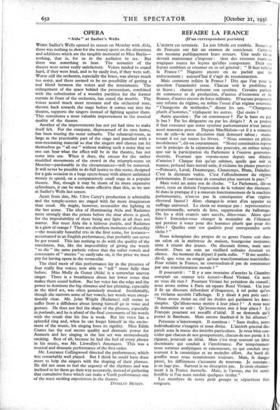OPERA
"Aida" at Sadler's Wells
WHEN Sadler's Wells opened its season on Monday with Aida, there was nothing to show for the money spent on the alterations and additions which are the tangible memorial to Miss Baylis— nothing, that is, for us in the audience to see. But there was something to hear. The acoustics of the theatre were never really satisfactory. Voices tended to sound hard, if they were loud, and to be easily lost, if they were soft. Worse still the orchestra, especially the brass, was always much too noisy, and there seemed to be no possibility of getting a real blend between the voices and the instruments. The enlargement of the space behind the proscenium, combined with the substitution of a wooden partition for the former curtain in front of the orchestra, has cured the trouble. The voices sound much more resonant and the orchestral tone, thrown back towards the stage before it comes out into the theatre, supports the singers instead of fighting against them. This constitutes a most valuable improvement in the musical quality of the theatre.
Another of the improvements has not yet had time to make itself felt. For the company, dispossessed of its own home, has been touring the outer suburbs. The rehearsal-room, as large as the practicable part of the stage and panelled with a non-resonating material so that the singers and chorus can let themselves go " all out " without making such a noise that no one can hear what the effect will be in the theatre, has not come into use. When it does, the excuse for the rather muddled movements of the crowd in the triumph-scene on Monday—pardonable in the circumstances—will be removed. It will never be possible to do full justice to this scene, designed for a gala occasion in a huge opera-house with almost unlimited money to spend, on a comparatively small stage in a popular theatre. But, though it may be shorn of its more expensive splendours, it can be made more effective than this, as we saw at Sadler's Wells last season.
Apart from this, Mr. Clive Carey's production is admirable and the temple-scenes arc staged with far more imagination than usual. He might, however, reconsider the lighting in the last scene. The idea of illuminating Aida and Radames more strongly than the priests before the altar above is good, for the improbability of there being any light at all does not matter. But must Aida die a hideous purple, and Radames in a glow of orange ? There are elsewhere moments of absurdity —the musically beautiful trio in the first scene, for instance— accentuated in an English performance, that probably can never be got round. This has nothing to do with the quality of the translation, but, like the impossibility of giving the words " to die " the same pathetic colour that the softer vowels and consonants of " morire " so easily take on, is the price we must pay for having opera in the vernacular.
The chief merit of this performance lay in the presence of four really fine voices, now able to " tell " more fully than before. Miss Molly de Gunst (Aida) is a somewhat uneven singer. There is a breathiness about her lower notes that makes them sound hollow. But her voice has the edge and the power to dominate the big climaxes and her phrasing, especially in the third act, was often genuinely musical. Incidentally, though she narrows some of her vowels, her words were excep- tionally clear. Mr. John Wright (Radames) still seems to suffer from a diffidence about letting himself go in voice and gesture. He does not feel the shape of the phrases, especially in parlando, and he is afraid of the final consonants of his words with the result that his line is weak. But his voice has a splendid ring and, when he can forget himself in the excite- ment of the music, his singing loses its rigidity. Miss Edith Coates has the real mezzo quality and dramatic power for Anmeris and her singing in the last act was tremendously exciting. Best of all, because he had the feel of every phrase in his music, was Mr. Llewellyn's Amonasro. This was a musical and dramatic performance of the first order.
Mr. Laurance Collingwood directed the performance, which was remarkably well played. But I think he could have done more to help the singers with the shaping of their phrases. He did not seem to feel the urgency of the rhythms and was inclined to let them go their way accurately, instead of gathering that cumulative force which can make a Verdi performance one of the most exciting experiences in the theatre.
DYNELEY HUSSEY.















































 Previous page
Previous page